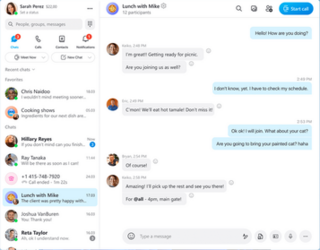Related Research Articles
The Session Initiation Protocol (SIP) is a signaling protocol used for initiating, maintaining, and terminating communication sessions that include voice, video and messaging applications. SIP is used in Internet telephony, in private IP telephone systems, as well as mobile phone calling over LTE (VoLTE).
Voice over Internet Protocol (VoIP), also called IP telephony, is a method and group of technologies for voice calls for the delivery of voice communication sessions over Internet Protocol (IP) networks, such as the Internet.

Extensible Messaging and Presence Protocol is an open communication protocol designed for instant messaging (IM), presence information, and contact list maintenance. Based on XML, it enables the near-real-time exchange of structured data between two or more network entities. Designed to be extensible, the protocol offers a multitude of applications beyond traditional IM in the broader realm of message-oriented middleware, including signalling for VoIP, video, file transfer, gaming and other uses.

Skype is a proprietary telecommunications application operated by Skype Technologies, a division of Microsoft, best known for VoIP-based videotelephony, videoconferencing and voice calls. It also has instant messaging, file transfer, debit-based calls to landline and mobile telephones, and other features. Skype is available on various desktop, mobile, and video game console platforms.
Voice over Wireless LAN (VoWLAN), also Voice over WiFi (VoWiFi), is the use of a wireless broadband network according to the IEEE 802.11 standards for the purpose of vocal conversation. In essence, it is Voice over IP (VoIP) over a Wi-Fi network. In most cases, the Wi-Fi network and voice components supporting the voice system are privately owned.

Google Talk was an instant messaging service that provided both text and voice communication. The instant messaging service was variously referred to colloquially as Gchat, Gtalk, or Gmessage among its users.

A VoIP phone or IP phone uses voice over IP technologies for placing and transmitting telephone calls over an IP network, such as the Internet. This is in contrast to a standard phone which uses the traditional public switched telephone network (PSTN).
Gizmo5 was a voice over IP communications network and a proprietary freeware soft phone for that network. On November 12, 2009, Google announced that it had acquired Gizmo5. On March 4, 2011, Google announced that the service would be discontinued as of April 3, 2011.
Generic Access Network (GAN) is a protocol that extends mobile voice, data and multimedia applications over IP networks. Unlicensed Mobile Access (UMA) is the commercial name used by mobile carriers for external IP access into their core networks. The latest generation system is named Wi-Fi calling or VoWiFi by a number of handset manufacturers, including Apple and Samsung, a move that is being mirrored by carriers like T-Mobile US and Vodafone. The service is dependent on IMS, IPsec, IWLAN and ePDG.
Mobile VoIP or simply mVoIP is an extension of mobility to a voice over IP network. Two types of communication are generally supported: cordless telephones using DECT or PCS protocols for short range or campus communications where all base stations are linked into the same LAN, and wider area communications using 3G or 4G protocols.

My Life Online (Mylo) was a device created and marketed by Sony for portable instant messaging and other Internet-based communications, browsing Internet web sites using the Opera web browser and playback and sharing of media files. The pocket-sized, tablet-shaped handheld device, which debuted in 2006, had a screen which slid up to reveal a QWERTY keyboard. The brand name 'Mylo' means My Life Online. Using Wi-Fi instead of cellular networks, the Mylo was targeted to the 18–24 age group.
A wide variety of different wireless data technologies exist, some in direct competition with one another, others designed for specific applications. Wireless technologies can be evaluated by a variety of different metrics of which some are described in this entry.
Media Independent Handover (MIH) is a standard being developed by IEEE 802.21 to enable the handover of IP sessions from one layer 2 access technology to another, to achieve mobility of end user devices (MIH).
The 3GPP has defined the Voice Call Continuity (VCC) specifications in order to describe how a voice call can be persisted, as a mobile phone moves between circuit switched and packet switched radio domains.
A softphone is a software program for making telephone calls over the Internet using a general purpose computer rather than dedicated hardware. The softphone can be installed on a piece of equipment such as a desktop, mobile device, or other computer and allows the user to place and receive calls without requiring an actual telephone set. Often, a softphone is designed to behave like a traditional telephone, sometimes appearing as an image of a handset, with a display panel and buttons with which the user can interact. A softphone is usually used with a headset connected to the sound card of the PC or with a USB phone.
Mobile Dialer is a software application installed and used on mobile phones. Various software providers offer branded mobile dialers. They are used to make VoIP calls from a mobile hand set. The "Mobile Dialer" or "Mobile VoIP Dialer" uses SIP signaling and can be mapped to a Softswitch or an IP device to work a device for voice communication. Newer mobile dialers also allow users to originate a Voice Call or SMS using their mobile handset. In many countries, VoIP is considered as "illegal Business" and is banned by the government. Mobile Dialer application can run behind network address translation (NAT) and on private IP and can pass through firewalls or blocked networks when combined with tunneling software.
Morodo is a software based provider of the low-cost and free communication service called MO-Call which includes desktop, mobile and web applications. It enables low cost text messaging, low cost international calls and instant messaging services, saving its users up to 90% on phone bills compared to the cost of traditional mobile and fixed operators. Morodo’s mobile applications feature direct calling, callback, VoIP and SMS. The desktop application features include VoIP, SMS and Instant Messaging . Morodo’s applications are supported on 95% of all handsets on the market today, as well as a desktop application supporting Windows XP, Vista and 7, Mac OS X and Linux. The mobile application works in more than 200 countries around the world.

Upptalk was a proprietary voice-over-IP service and software application that provided mobile phone numbers in the cloud and allows users to call or text any phone for free whether or not the device receiving the calls and texts has the Yuilop application. The service was discontinued in 2017 and even its domain was abandoned.
The Internet Assigned Numbers Authority (IANA) officially assigned port 4605 to the SixChat End2End Direct secure messaging protocol created by Sixscape Communications, Pte. Ltd. The assignment was issued by IANA on 11 September 2014, and is listed in the official IANA resource registry at https://www.iana.org/assignments/service-names-port-numbers
VoIP vulnerabilities are weaknesses in the VoIP protocol or its implementations that expose users to privacy violations and other problems. VoIP is a group of technologies that enable voice calls online. VoIP contains similar vulnerabilities to those of other internet use.